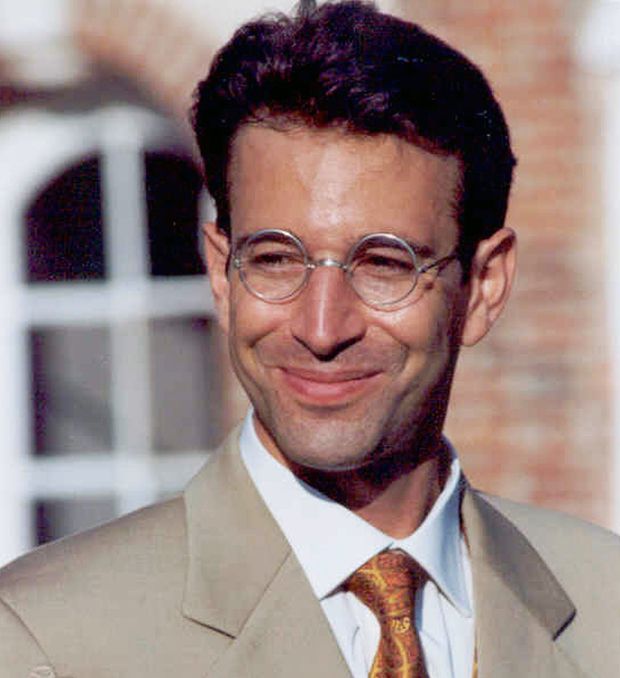ISLAMABAD, Pakistan—The country’s Supreme Court ordered the release of the man convicted in 2002 of orchestrating the abduction and killing of Wall Street Journal reporter Daniel Pearl after effectively clearing him of wrongdoing in the case.
A three-judge panel on Thursday upheld a lower-court ruling that overturned terrorism and murder convictions for Omar Sheikh, who has spent more than 18 years in prison for the crimes. The judges also overturned a third conviction, for kidnapping. The court said it would explain its reasoning at a later date.
Pakistani authorities and Mr. Pearl’s family had asked the Supreme Court to reinstate the convictions and a death sentence against Mr. Sheikh. Last month, the U.S. government, which repeatedly criticized the lower court’s actions, said it stands ready to bring Mr. Sheikh to the U.S. for trial.

Daniel Pearl was the Journal’s South Asia bureau chief.
Photo: Getty Images
A lawyer for the Pakistan government, Faiz Shah, said he was disappointed by Thursday’s outcome and said authorities would challenge the verdict. Prosecutors can file what is known as a review petition, asking the court to reconsider its decision.
One of the three judges who heard the case dissented, which Pakistani lawyers said increased the chances that such a request could succeed. But it is rare for a court to reverse itself, the lawyers said.
“Today’s decision is a complete travesty of justice” that “puts in danger journalists everywhere,” the Pearl family said in a statement released by their lawyer. “We urge the U.S. government to take all necessary actions under the law to correct this injustice.”
Matt Murray, the Journal’s editor in chief, said: “This is an infuriating and unjust decision. We’ll continue to support efforts to hold to account those responsible for the brutal murder of Danny.”
U.S. officials remain convinced Mr. Sheikh played a major role in Mr. Pearl’s abduction and killing. And Washington has pressed Pakistan to keep Mr. Sheikh in prison. How Islamabad handles U.S. demands will be an early test of relations with the new administration of President Biden.
There was no immediate comment from the U.S. government Thursday.
Mahmood Sheikh, the lawyer for Omar Sheikh, said Pakistan’s laws and constitution don’t allow another country to now put his client on trial. “Our judiciary has shown it is free of any influence, no matter how strong that person or country may be,” he said.
At the time of his death, Mr. Pearl, then the Journal’s South Asia bureau chief, was reporting on militant networks in Pakistan in the wake of the Sept. 11, 2001, terrorist attacks. He disappeared in the southern city of Karachi in January 2002. He was killed days later, beheaded in an execution that was videotaped and released on the internet.
The killing put pressure on Pakistan, which had just joined as a partner with the U.S. in its fight against terrorism, to solve the case. The country investigated with the help of the U.S.’s Federal Bureau of Investigation.
Fewer than six months after the killing, Mr. Sheikh was convicted of kidnapping for ransom, terrorism and murder, and he was sentenced to death. Three other alleged accomplices were given life in prison. The same lower court that overturned Mr. Sheikh’s convictions also overturned those of the other three men. The Supreme Court ruled Thursday that they, too, should be freed.
The Pearl family wasn’t involved in the original 2002 trial, but after a lower court in Karachi in April 2020 ruled that Mr. Sheikh should be released, the family, as well as the Pakistani authorities, took an appeal to the Supreme Court.
The lower court had found that Mr. Sheikh was still guilty of kidnapping—a lesser crime than kidnapping for ransom—but the time he had already spent in jail was more than the maximum penalty.
The Journal’s publisher, Dow Jones & Co., a unit of News Corp, contributed to the legal fees for the family’s appeal.
Mr. Sheikh dropped out of college in London in the early 1990s and flew to Pakistan, where he allegedly joined a jihadist group. That group sent him to India, where he was imprisoned in 1994 in connection with the kidnapping of Western tourists. He was freed five years later after the hijackers of an Indian plane demanded that he and other militants be released.
Mr. Sheikh’s father, Saeed Ahmed Sheikh, who attended the proceedings at the Supreme Court, which continued for months, said he was relieved. He said he didn’t yet know where his son would live. The family’s main home is in the U.K.
“It has been agony, complete agony. This has devastated the family, devastated his career,” said Mr. Sheikh, the father, speaking at the court just after the verdict. “We now have to pick up the pieces and start afresh.”
U.S. officials believe that the kidnapping of Mr. Pearl soon drew the attention of al Qaeda’s operations chief, Khalid Sheikh Mohammed, a Pakistani believed by the U.S. to be the chief planner of the Sept. 11 attacks.
Mr. Mohammed was captured in Pakistan in 2003 and imprisoned at Guantanamo Bay. Four years later, after being subjected repeatedly to waterboarding—an interrogation technique called torture by human-rights groups and now prohibited by the U.S. government—he appeared before a military tribunal at the base and confessed to the murder of Mr. Pearl.
The alleged role of Mr. Mohammed hasn’t figured in the cases before the Pakistani courts, nor has he been charged with the crime in U.S. custody, where he remains.
Write to Saeed Shah at saeed.shah@wsj.com
Copyright ©2020 Dow Jones & Company, Inc. All Rights Reserved. 87990cbe856818d5eddac44c7b1cdeb8


